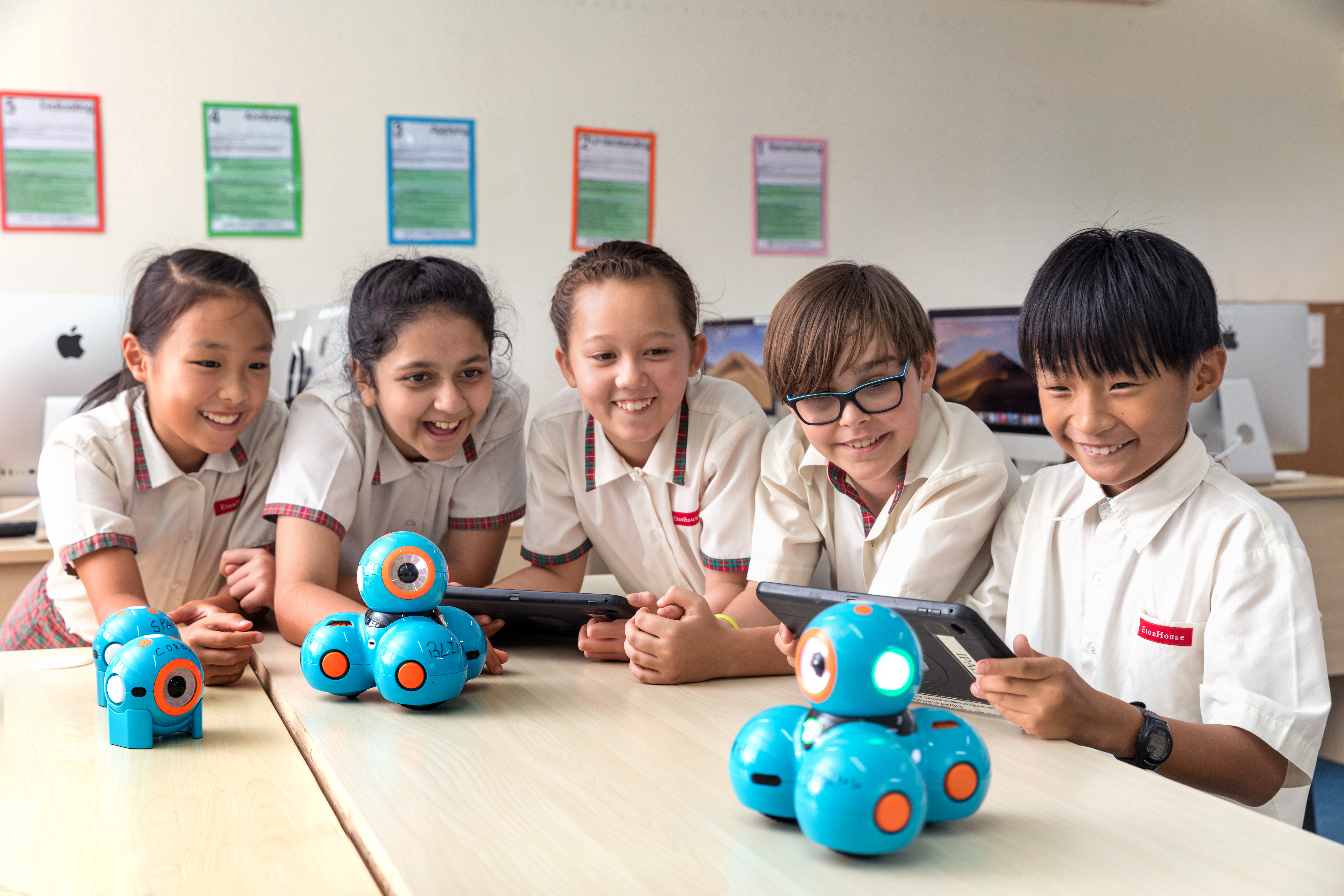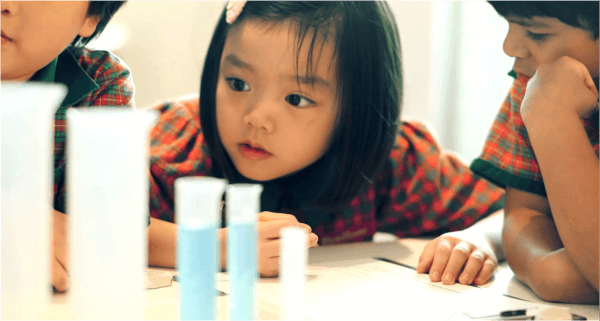-1.png)
EtonHouse Singapore
“Mummy, where does water come from?”
“The tap.”
“But where does tap water come from?”
“The reservoir.”
“What is a reservoir?”
“It’s a place that collects a big supply of treated water for our use.”
"And where does that water come from?”
“Well… From the rain…”
How often have you been stumped by your child’s endless questions? At times, you wonder how a three-year-old can be so imaginative and inquisitive.
Every child has an innate need to ask questions. The key to a child’s development lies in how the school supports and nurtures this inquisitive nature, growing a love for lifelong learning.
Visit our EtonHouse campuses and learn about our unique bilingual inquiry-based approach.

Conversations between a child and a teacher are common in preschools that use the inquiry-based learning approach. Children are encouraged to question facts, explore possibilities, voice their opinions and initiate investigations, allowing them to acquire knowledge and skills in a meaningful way. Teachers trained professionally in this approach are skilled in helping your child develop both simple and complex competencies that are useful when he transits to primary school.
Here are some key competencies:
Motivation
A child who learns through inquiry is much more motivated as he can explore his interest and actively participate in searching for answers to his questions.
When Makiko first enrolled her three-year-old son, Cole, with EtonHouse, he was unable to articulate his thoughts well. Over time, learning through inquiry spurred Cole to express himself through drawing, music and class projects. He also began to communicate his ideas and thoughts more frequently. Now, in primary school, Cole is able to speak up confidently in class and during class presentations.
Importantly, inquiry engages the child on a subject matter of his interest, thus enhancing his motivation and ability to remember the information within a context that he inquires about.
Oracy & Literacy Skills
Oracy is the ability to express oneself fluently. Oracy and the confidence to speak are nurtured in preschools through the active exchange of ideas in an inquiry process. It encourages children to express themselves, preparing them for language learning in primary school. The Primary One Chinese syllabus is now more focused on building oracy skills with show-and-tell, read-aloud and picture description assessments, while the use of stimulus-based conversations in English has since replaced the picture description assessment. Students are now expected to be able to articulate their personal experiences and opinions on a range of topics.
To strengthen children’s literacy skills before they enter primary school, preschools employing the inquiry-based learning approach introduce regular journaling or experiences that incorporate writing. Children are encouraged to write about what they have learnt from their discussions or participate in role-playing and writing letters. In the process, they learn writing and grammar contextually, learn to construct sentences and expand their vocabulary.
Literacy skills are then developed holistically, similar to the STELLAR programme adopted in primary schools. This makes learning languages meaningful and relevant, and writing becomes interesting and enjoyable.
Numeracy Skills
Mathematical concepts are learned in the same way and intentionally woven into the topics of inquiry the children are investigating.
For example, besides basic Mathematics operations like addition and subtraction, a teacher may extend the inquiry to investigate the question ‘How big is a reservoir?’ and guide the children to understand how numbers can be applied to units of measurement. Hands-on experiments follow closely after, to help children visualise how different volumes add up to one litre of water.
Through inquiry, children grasp concepts and discover strategies to solve problems. Supported by the teachers, they learn that there are so many ways to derive the answer through inquiry.
General Knowledge
One unique advantage of the inquiry approach is the general knowledge that a child acquires. Since inquiry-based learning is child-led and adult-facilitated, a topic of interest can lead to various trains of thoughts and ideas, akin to a mind-map. The knowledge acquired is varied and almost infinite, because it is not limited by a typical ‘lesson plan’. Skilled teachers know exactly how to facilitate and delve into children’s interests or intentionally extend them to cover a wider topic and more aspects of learning.
For instance, Makiko shared that an inquiry on oceans in Cole’s class got everyone excited about how they could protect marine life from pollution. Discussions on how this message could be conveyed to people sparked their desire to create posters - an exercise that required them to research, draw and come up with taglines and slogans. Through this, the children also learnt about pollution and conservation efforts.
Accumulating a wealth of general knowledge from early years will benefit your child. Think of it as saving from young. You never know when the knowledge will come in handy when your child starts writing essays, dealing with math problems or learning scientific theories later on.
Critical Thinking Skills

Critical thinking skills are required in many aspects of primary school education from Science, Mathematics and English Comprehension to show-and-tell and project work.
In preschools, the inquiry-based learning process encourages children to analyse the information they have gathered, investigate further, and communicate their understanding through different mediums like drama, music or technology. Developing these critical thinking skills help them build resilience in problem-solving from an early age.
Ability To Apply Concepts
Application is another key focus in today’s education system. No longer can one ‘spot exam questions’ and simply memorise the model answers to excel academically.
The ability to apply concepts doesn’t come naturally. The good news is, learning by inquiry is both contextual and situational. A child learns to link ideas spontaneously and apply concepts by reflecting on his questions, what he thinks after obtaining all the information, the future actions that he can take and how he can apply this newfound knowledge in other contexts. Learning through inquiry teaches your child how to think in a way that will provide him with the skills and passion for lifelong learning. The earlier your child forms this foundation of learning, the better.
Start on the right track now
Getting your child on the right track can make a huge difference, be it in terms of skills, knowledge or the most priceless thing – his attitude towards learning. Makiko aptly sums up the greatest merit of the inquiry approach, “It creates an enjoyment towards learning and I feel that it forms a great foundation in becoming a lifelong learner.”
Start your child’s Pre-School journey with EtonHouse. Our learning environments are purposefully designed to support your child’s curiosity about the world around them, and our curriculum is personalised to engage and challenge each and every student.
Visit our EtonHouse campuses and learn about our unique bilingual inquiry-based approach.



